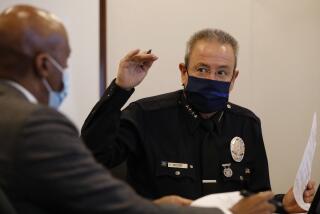Questionnaire for Jury in King Case Debated
- Share via
With the trial fast approaching for four Los Angeles police officers accused of beating Rodney G. King, defense lawyers and prosecutors spent Thursday wrangling over the final wording of a questionnaire for potential jurors--a task that experts say may be crucial to the outcome of the case.
The questionnaire is designed, in part, to determine what the jurors know about the highly publicized case and whether they can be objective. Jury experts say the language of the questions is critical--every nuance or subtle turn of a phrase might put an unwanted idea in a potential juror’s mind.
The debate turned on such questions as: Should King’s encounter with police be called “a beating?” Or should the question say he was “struck with batons?” Should the word punish be allowed in a question about the use of excessive force? Should the word excessive be permitted at all?
By morning’s end the tussle over wording, which has been going on in private for months, was tentatively put to rest when the prosecution and defense agreed to let Superior Court Judge Stanley Weisberg come up with his own language for some of the more hotly contested questions in the 40-page document, which was not made public.
Debating these seemingly small points of word choice is no small matter, according to experts in jury selection. They say such questionnaires give jurors their first impression of a case, helping to shape their views before they hear a word from the lawyers or witnesses.
According to Elizabeth Loftus, a psychology professor at the University of Washington who studies juries, an adept attorney can use jury questionnaires to do “a little bit of brainwashing. . . . It’s a powerful tool, and in the hands of people who know what they’re doing it can give that little advantage.”
In California, jury questionnaires have been used with increasing frequency in criminal trials since the passage of the so-called “speedy trial initiative” in 1990. The measure curtailed the ability of prosecutors and defense lawyers to orally question potential jurors.
Since then, the questionnaires have been used by lawyers as “an opportunity to get to know jurors, to get a sense of some of their underlying attitudes and biases,” said Gerald Uelmen, dean of the Santa Clara University Law School.
Uelmen also said lawyers and judges are becoming more careful about what they ask in the questionnaires because of a recent California Supreme Court decision that criticized written questions as irrelevant in a death penalty case.
In the King case, Thursday’s debate over the questionnaire marked the final phase of preparation for the trial of Officers Theodore J. Briseno, Laurence M. Powell, Timothy E. Wind and Sgt. Stacey C. Koon. The four are charged with assault under color of authority in the beating of King, which caused a national uproar last March after an amateur cameraman captured it on videotape.
Their trial is scheduled to begin Feb. 3 in the East Ventura County Courthouse in Simi Valley. The case was moved out of Los Angeles County after an appeals court found that pretrial publicity and political fallout had jeopardized the officers’ right to a fair trial.
Weisberg has estimated that it will take a month to select the jury, including a week for the lawyers to review the candidates’ answers to the questionnaires. An estimated 2,000 jurors will be called initially, although many are expected to be excused because it will be a financial hardship for them to serve.
Prosecutors Terry White and Alan Yochelson declined to discuss any aspect of the questionnaire. But the debate inside the courtroom, as well as interviews with defense lawyers, made clear that the questions touch on many sensitive topics, ranging from matters of race relations to the way the potential jurors view the police.
The most heated discussion centered on a question that would ask jurors whether they believe police officers accused of crimes should be treated the same as other defendants. Defense lawyers strongly objected, arguing that police officers are not like ordinary citizens because the police can use force in the line of duty.
“There are issues here that are different than those in a normal criminal trial,” said defense lawyer Darryl Mounger, who represents Koon. “The law gives a police officer the right to arrest people, and the issue here is how they go about effecting that process when they are met with a bizarre set of circumstances.”
There was intense debate, as well, over a question that explored the issue of “street justice”--that is, whether officers ought to be permitted to use excessive force to punish a suspect rather than to arrest or subdue him. Weisberg’s suggestion that the word punish be used in the question brought an outcry from Briseno’s lawyer, John Barnett.
“Your honor,” said a frustrated Barnett, “this punish thing has got to go, with all due respect.”
More to Read
Sign up for Essential California
The most important California stories and recommendations in your inbox every morning.
You may occasionally receive promotional content from the Los Angeles Times.










